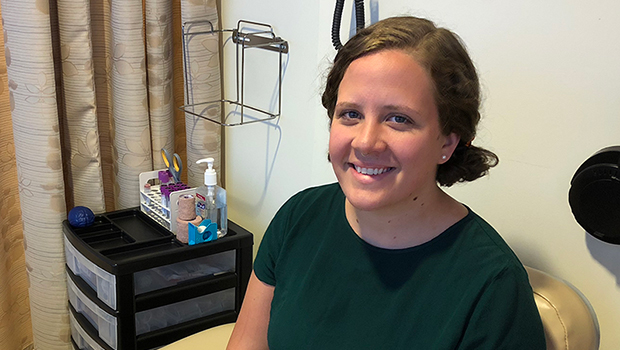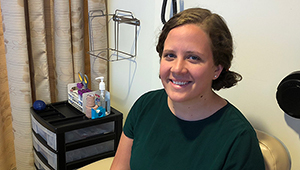Volunteering for health research: To join or not to join?

KPWHRI research participant Carolina Reid learned all she could about the Institute and its vaccine studies before volunteering to take part.
How KPWHRI and its Institutional Review Board help potential study participants make informed decisions
When Carolina Reid was considering whether to join a vaccine study at Kaiser Permanente Washington Health Research Institute (KPWHRI), she contacted a friend in nursing school. “She gave me these pointers,” Ms. Reid explains. “Find out who is funding the study and whether the vaccine has been tested in any capacity yet.” Only after taking her friend’s advice and learning all she could absorb about the study requirements and the researchers did Ms. Reid decide to participate.
It’s an approach Tanya Matthews, KPWHRI’s Institutional Review Board (IRB) manager, totally endorses. “Deciding whether to be in a study is an important decision, and I want our participants to have all the information they need to make the right choice for themselves,” Ms. Matthews says.
For Ms. Reid, that meant learning more about the Institute itself. “If you’re looking to sign up for medical research…see what other studies they have been doing. That gives you a sense of their legitimacy. In terms of privacy, make sure you are reading through all of the paperwork.”
“Whether completing a one-time survey or participating in a clinical trial, KPWHRI is committed to making sure that potential participants are informed about the purpose, process, and protections of the research,” Ms. Mathews adds. “We believe a person can only make an informed decision in a transparent and participant-centered environment.”
The IRBs protects human subjects’ rights
One way to create that environment is to involve non-scientists on the IRB, the committee that reviews research plans to ensure the protection of study participants. At Kaiser Permanente Washington, community member Dianne Johnson helps to fill that role. For the past two years, Ms. Johnson has participated in the IRB’s monthly meetings.
“At every meeting, we make sure the studies we review will follow the three main principles of the Belmont Report, the required standards for doing ethical research,” she explains. Those principles are “respect for persons, beneficence, and justice.”
“Respect for persons” means that people should be given total freedom to make decisions about research participation. People who don’t have total decision-making freedom—such as prisoners or those with developmental disabilities, for example—need to be protected from being exploited by research, the Belmont Report explains.
The term “beneficence” means doing good and avoiding harm; research needs to be executed in a way that maximizes benefits and minimizes risk.
And the principle of justice is the idea that the risks and the benefits of the research should be equally distributed among all people whom it could affect. For example, researchers should not select populations for their studies simply for convenience or to protect one class of people more than another.
Research is an ever-changing landscape
Because science is a constantly evolving field, innovative approaches to research have resulted in new federal regulations about human subjects research and new considerations for the KP Washington IRB, Ms. Matthews explains. “Since the IRB’s mission is to protect the rights and welfare of study participants (and here that means mostly Kaiser Permanente members), we have to keep abreast of new research methods, study designs, and projects in new topic areas,” she adds. “Of late, we have had many productive conversations about the ethics of big data studies, pragmatic trials, opioid studies, and complex multi-site clinical trials.”
To maximize their knowledge about human subjects protections, Dr. Matthews and her team subscribe to multiple informational listservs and ethics publications. They also attend conferences and partner with the IRBs from other Kaiser Permanente regions.
“We’re a curious group,” Ms. Matthews reflected, “and we are always looking for ways to make good decisions for our members and research participants.”
More information about Kaiser Permanente Washington’s IRB is available on a new web page, along with key questions you should ask before joining a study. We also have a page listing studies currently recruiting study participants.
- By Susan Brandzel
More Information
If you have questions or concerns about being in a KPWHRI research study, please contact:
Kaiser Permanente Washington Health Research Institute
Metropolitan Park East
1730 Minor Avenue, Ste. 1600
Seattle, WA 98101
Practicing Gratitude

Lessons in gratitude: Even small gestures can mean a lot
Project manager Kelly Ehrlich always appreciated study participants’ contributions to research. Then she received a gift that reflects just how important it is to let them know.
Read it in Healthy Findings.
Healthy Findings Blog

Oprah shines light on Henrietta Lacks and the ethics of genetic research
Dr. Evette Ludman talks about Oprah’s HBO production of The Immortal Life of Henrietta Lacks and the ethical issues still alive in genetic research today.
Read it in Healthy Findings.
KPWHRI News

October 2018
- Volunteering for health research: To join or not to join?
- Kaiser Permanente researchers study bariatric surgery for obese teens
- CATALyST K12 Scholar Program: A spark for future LHS researchers
- Addressing economic disparity while growing membership: Lowering cost is essential
- What do patients understand about dementia prevention?


